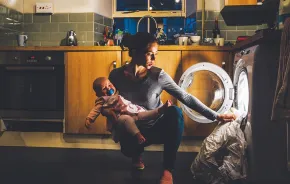 As I've read the latest research on parenting and childhood, I have reflected on how much of who my children become is intertwined with the circumstances they were born into. No matter how naturally bright or wonderful they are, given different circumstances, they could be selling gum to tourists to help support the family, or digging through the garbage of a third-world slum for food. I sometimes wonder how much potential is lost to poverty, to addiction, to abuse and neglect. The following experience, originally published on my personal blog, has had a tremendous impact on how I view childhood's role in who we become.
As I've read the latest research on parenting and childhood, I have reflected on how much of who my children become is intertwined with the circumstances they were born into. No matter how naturally bright or wonderful they are, given different circumstances, they could be selling gum to tourists to help support the family, or digging through the garbage of a third-world slum for food. I sometimes wonder how much potential is lost to poverty, to addiction, to abuse and neglect. The following experience, originally published on my personal blog, has had a tremendous impact on how I view childhood's role in who we become.
It was one of those scorching summer days when I could feel the soles of my sneakers turn sticky and soft against the concrete. I guzzled water and let it trickle down the neck of my shirt beneath my Kevlar vest. If I wasn't working I’d probably be wearing something light and breezy, like a cotton dress. Instead, I felt claustrophobic inside my uniform: Black, knee-length shorts and a utility belt that held handcuffs, pepper spray, a police radio and a collapsible baton that was meant to be used as a weapon for self-defense. My bulky white shirt buttoned over my ill-fitting bullet-proof vest made my upper body look huge and emphasized my skinny legs, “like an orange with toothpicks for limbs,” is how Nick, one of the other officers, described me.
I often wondered what made those who hired me think I was suited to be a security officer. I was a scrawny, pale, 19-year-old girl, the one who blushed when someone used profanities. After many discouraging weeks looking for a summer job to fill the gap between my college classes, I ended up at Riverfront Park in Spokane, Washington, the sprawling acreage where most of the city’s major events took place. I was expected to work a job where I dealt with a very peculiar group of people; Drunk people, men who ran naked through the playground, women who picked fights and spat at people when they were angry. I was the only female working with seven men who all seemed to be on high-protein diets and aspired to someday become police officers or firefighters.
But I stayed. I worked that summer, then the next, and the next. My confidence grew as I found that I could do the work, and that the hours of bike-riding in the park made all of the other aspects of the job worth it. But I also began to feel jaded. Spokane’s meth epidemic ensured that there was a steady stream of drug addicts in the park boundaries, living under bridges and along the banks of the river like an infestation. My frustration with people who threw their lives away on drugs and bad choices mounted. I developed a smugness that overshadowed the compassion I might have shown. “Those people” made my job difficult, made the beautiful park less safe.
Then came that sultry day in August — a day when my only reprieve from the heat was to ride my bike down all of the inclines along the river-cooled trails surrounding the park, creating my own breeze. It was the day I found Stephen.
Despite the relentless, muggy heat, the park was crowded with people. I’d taken a break from riding, parked my bike beside the carousel along the water, and began conversing with the other officers working the shift. The music from the carousel echoed across the river, mingling with the staccato of children laughing, and quacks of the ducks as they fought over bread crumbs on the waterfront. That’s when I first saw him, sprawled in the grass. Despite the stifling heat and incessant noise, he lay still, asleep. His forehead was heavy with wrinkles, his skin and hair the same shade of sandy brown except for the big, purplish circles under his eyes. His frame was small and thin and something about his face looked sad, even in his sleep. The sun was beating down on him and I wondered how long it would be before he was sunburned.
I rode on, made my rounds, and returned a few hours later. He was still sleeping in the same spot, his face now a deep red.
“We should wake him up,” I said to Nick, one of the other officers.
Nick walked over and nudged the man with his boot. “Hey man! Wake up!” he yelled. The man didn’t even stir. I tried rousing him by shaking his arm. Nothing. “Get the smelling salts,” said Nick. I retrieved the ammonia salts from the first aid kit in the carousel and watched as Nick held them under his nose. The man twitched, started coughing, then sat upright, squinting his eyes against the sunlight.
“You’ve been asleep for a long time,” I said. “Are you okay?”
“I’m fine,” he replied. “I’m just tired.”
I knew right away I was dealing with a meth addict. Half his teeth were missing, the other half black with rot. He had track marks up and down his arms and a faint cat-urine smell emanated from him. He was probably “crashing” when we woke him up — meth addicts can sleep for days at a time when coming down from a high.
“What’s your name?” I asked.
He shifted uncomfortably and answered, “Stephen.”
I asked him for his ID and he handed me his driver’s license. As I wrote his full name down in my notepad, a wave of recognition washed over me.
Suddenly I was five years old again, perched on top of a wood pile along my back fence, chucking rocks at a boy in the alleyway as I yelled all of the bad words that my five-year-old vocabulary held. I can’t recall why I decided to throw rocks at the poor boy in the alley, but I do remember how awful I felt when he started crying. He looked up at me with the saddest blue eyes I had ever seen and asked, “What’s your name?”
“I’m Rory,” I replied.
“Do you want to play?”
That’s how our friendship began. I was cruel and he was forgiving. It was the first of many days we spent playing in my yard — digging in the sand, climbing trees, picking dandelions. I was a bossy child, and he sweetly let me dictate our games. The only time I remember him ever trying to take charge was the day he tricked me into kissing him.
Loving someone enough to see their potential, even when you have to squint to see it, is a gift.
“I’m the mommy and you’re the daddy,” I said.
“If I’m the daddy, you have to kiss me,” he replied.
“No. I don’t have to kiss you.”
“It’s what mommies and daddies do!” he insisted.
I let him kiss me. And I liked it. When my brother came out and teased me about it, I punched Stephen in the arm and told him to go home.
I stand there for a moment with the first boy I ever kissed, slowly taking in the scars on his face, the dirt caked to his shirt. I close my notebook and slip it back into my pocket.
“Stephen? Do you remember me? It’s Rory.” My voice sounds broken and strained. His eyes are dull and his expression vacant for a moment, then the glow of recognition slowly spreads across his face and sparkles in his bloodshot blue eyes.
“Hey, yeah, how’ve you been?” he says.” Do you still sing? I remember you liked to sing.”
“Yes, sometimes.” I reply.
I recall the first time I went to his house and asked to see his bedroom. He opened a hallway closet and showed me a crumpled sleeping bag on the floor. His sister, who was only a few years older than us, made us Top Ramen. I was amazed she knew how to use the stove. His mom wore a lot of green eye shadow and smoked cigarettes that smelled like cinnamon. He told me he didn’t have a dad. As a child, I didn’t understand what all that meant, but now the memory makes my heart ache.
“Well, Stephen, it’s so good to see you,” I say, trying to regain my composure. My throat aches and I can feel the tears welling behind my eyes. I fumble to put my sunglasses on. “Next time you take a nap maybe find some shade, okay?”
He holds his hand out and I shake it. His hand feels like a dead fish, so cold.
I haven’t seen him since that day, but I’m haunted by thoughts of that little boy with the blue eyes and shy smile. It’s easy to overlook people, to brush them aside as someone who isn't worth the time or compassion. What would I have become, given different circumstances? None of us really know how close or how far removed we are from the sunburned man sleeping in the grass. Loving someone enough to see their potential, even when you have to squint to see it, is a gift. It’s seeing that shy boy behind the mask of drug addiction and filth. It’s asking the mean girl who threw rocks at you what her name is, asking her if she wants to play.











